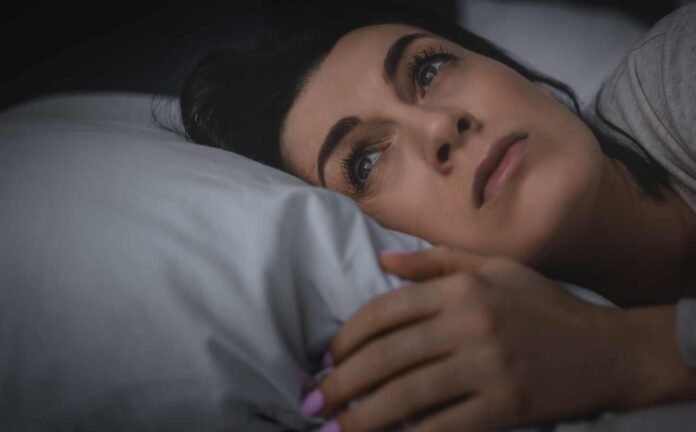Insomnia, a sleep disorder affecting millions worldwide, can significantly impact daily life.
It involves difficulty falling asleep, staying asleep, or waking up too early and not being able to go back to sleep. Individuals suffering from insomnia often experience fatigue, mood disturbances, and impaired performance in work or school settings.
Many factors contribute to insomnia, ranging from stress and anxiety to poor sleep habits and certain medical conditions. Understanding the root causes of insomnia is crucial for effective management. Treatments often include lifestyle changes, behavioral therapies, and, in some cases, medications.
Insomnia can be short-term, lasting a few days or weeks, or chronic, persisting for months or even years. Identifying symptoms and intervening early can help prevent the condition from becoming a long-term issue. Effective treatment can improve overall well-being and quality of life.
Understanding Insomnia
Insomnia manifests as difficulty falling asleep or staying asleep and can impact daily life and overall health. It is categorized by different types and affects people in various ways.
Definition and Prevalence
Insomnia is a common sleep disorder characterized by difficulty initiating or maintaining sleep. Acute insomnia lasts for a short duration, often due to stress or life changes. Chronic insomnia persists for at least three months and occurs at least three times a week.
Research indicates that between 10% and 30% of adults suffer from insomnia at some point. Chronic insomnia is seen in 6% to 10% of the population. Insomnia affects all age groups but is more prevalent in older adults and females.
Causes of Insomnia
The causes of insomnia vary widely. Acute insomnia often results from situational stress, illness, or environmental factors like noise. Chronic insomnia can be linked to lifestyle habits such as irregular sleep schedules, medication side effects, and persisting mental health conditions like depression and anxiety.
Medical conditions like asthma, arthritis, and chronic pain also contribute. Shift work and frequent travel can disrupt the body’s circadian rhythm, worsening insomnia. Identifying the underlying cause is key to effective treatment.
Symptoms and Diagnosis
Symptoms include difficulty falling asleep, frequent night awakenings, and waking up too early. Daytime consequences involve fatigue, irritability, and concentration issues, impacting professional and social life.
Diagnosing insomnia generally involves a detailed medical history and physical exam. Sleep studies, including polysomnography, help rule out other sleep disorders. Sleep diaries and questionnaires like the Insomnia Severity Index can provide additional insights into the severity and impact of the condition.
Insomnia affects both physical and mental health, necessitating careful evaluation and targeted treatment strategies.
Factors Affecting Insomnia
Various elements contribute to insomnia, ranging from lifestyle habits to psychological and physical health conditions. Understanding these factors can be crucial in addressing the root causes and seeking effective treatments.
Lifestyle and Environment Influences
Lifestyle choices play a significant role in insomnia. Caffeine and alcohol consumption can disrupt sleep patterns. Irregular sleep schedules and shift work can also interfere with the body’s natural circadian rhythms. Additionally, an environment that’s noisy, too bright, or uncomfortable can make it hard to fall or stay asleep. Electronic device usage before bedtime exposes individuals to blue light, which can hinder melatonin production, making sleep onset more challenging.
Psychological Factors
Mental health issues like stress, anxiety, and depression are common contributors to insomnia. Stress can cause the mind to race with thoughts, making it hard to relax. Anxiety often leads to worry about falling asleep, thus creating a cycle of sleeplessness. Depression can disrupt the sleep-wake cycle, causing both fatigue and sleepless nights. Traumatic experiences and major life changes can also impact sleep quality.
Physical Health Conditions
Certain medical conditions can also lead to insomnia. Chronic pain from ailments like arthritis or fibromyalgia makes it hard to find a comfortable sleeping position. Heart disease and diabetes can cause discomfort or the need to urinate frequently at night. Asthma and other respiratory issues may lead to nighttime awakenings. Cancer and its treatments can produce symptoms such as nausea or pain that disrupt sleep. Additionally, obesity can result in sleep apnea, causing frequent interruptions in breathing during sleep.
Risk Factors and Population
Insomnia affects various demographics differently, with potential risk factors ranging from age and gender to lifestyle choices and health conditions. These elements contribute to the likelihood of experiencing insomnia and its severity.
Demographic Differences
Age is a significant factor in insomnia. Older adults often experience changes in sleep patterns, leading to more frequent awakenings and less deep sleep.
Teens and children are not immune, with school stress and screen time impacting sleep.
Women may face higher insomnia rates, especially during pregnancy and menopause, due to hormonal changes. Menopause can cause hot flashes and night sweats, which disturb sleep.
Health-Related Risk Factors
Certain health conditions are closely linked to insomnia. Mental health disorders like depression and anxiety often interfere with sleep.
Chronic pain from conditions such as arthritis also makes falling or staying asleep difficult.
Medications, including beta-blockers and antidepressants, may lead to insomnia as a side effect.
Other contributing factors include sleep disorders like sleep apnea and chronic illnesses such as diabetes and heart disease.
Behavioral and Substance Influences
Substances like caffeine, alcohol, and nicotine significantly affect sleep. Caffeine, found in coffee and some medications, stimulates the nervous system, making sleep challenging.
Alcohol might initially induce sleep but disrupts sleep cycles later in the night. Nicotine, found in tobacco, acts as a stimulant that interferes with sleep quality.
Poor sleep habits, like inconsistent sleep schedules and excessive screen time, also play roles. Shift work and travel can disrupt internal body clocks, contributing to insomnia. These behavioral factors often stem from lifestyle choices and can be adjusted to improve sleep.
Impact of Insomnia
Insomnia affects various aspects of a person’s life, leading to issues with mental health, physical well-being, and daily functioning.
On Mental Health
Insomnia is closely linked to mental health disorders. Chronic sleep deprivation can lead to anxiety and depression. Individuals often experience increased irritability and mood swings. There is also a notable impact on cognitive functions, such as memory and concentration. Persistent insomnia can worsen existing mental health conditions, making it harder to manage daily stress.
On Physical Health
The physical health consequences of insomnia are significant. Insufficient sleep increases the risk of developing heart disease and high blood pressure. Long-term insomnia is associated with a weakened immune system, making individuals more susceptible to infections. Fatigue and daytime sleepiness are common, reducing overall physical performance and leading to potential accidents.
On Daily Functioning
Daily functioning is severely compromised by insomnia. Fatigue and lack of focus lead to decreased performance in professional and personal tasks. There is an increased likelihood of accidents both at the workplace and while driving. Insomnia can cause hyperactivity in some individuals, further disrupting their ability to manage daily tasks efficiently. Reduced sleep quality hampers daytime performance, affecting productivity and social interactions.
Approaching Treatment
Treating insomnia involves various strategies, including medical interventions, behavioral therapies, and lifestyle modifications. Each approach targets specific aspects of sleep disturbances.
Medical Interventions
Medical treatments for insomnia often involve prescription medications. Zolpidem, eszopiclone, suvorexant, ramelteon, and triazolam are common choices. These medicines act on the brain to induce sleep or maintain it.
Melatonin supplements can also be beneficial, particularly for those with disrupted sleep-wake cycles. It’s crucial to consult a doctor to determine the best medication and dosage. Misuse can result in dependency or adverse effects, so professional guidance is essential.
Behavioral and Psychological Therapies
Behavioral and psychological therapies offer non-pharmacological options. Cognitive Behavioral Therapy for Insomnia (CBT-I) is highly effective. It involves identifying and changing thoughts and behaviors that affect sleep.
Techniques include sleep restriction therapy, stimulus control, relaxation techniques, and maintaining a sleep diary. These methods help to create a conducive environment and mindset for sleep.
Lifestyle Modifications and Self-Care Practices
Simple lifestyle changes can significantly impact sleep quality. Regular physical activity and exercise are beneficial. Practicing sleep hygiene—consistent sleep schedules, a comfortable sleep environment, and limiting caffeine and electronics before bed—promotes better sleep.
Maintaining a balanced diet, managing stress, and establishing a calming bedtime routine are also useful. Self-care is a practical and important component in managing insomnia.
Managing Sleep Habits
Effective management of sleep habits involves establishing a consistent sleep schedule, creating an environment conducive to rest, and continuously monitoring and adjusting sleep patterns. These steps are essential for promoting healthy sleep hygiene and improving overall sleep quality.
Developing a Sleep Schedule
A consistent sleep schedule is crucial for regulating the body’s internal clock. It involves going to bed and waking up at the same time every day, even on weekends. This regularity helps train the brain to associate these times with sleep, making it easier to fall asleep and wake up.
Gradually adjusting bedtime by 15-30 minutes each night can help shift the sleep schedule without causing stress. Avoid napping during the day, especially in the late afternoon, as it can interfere with nighttime sleep. Sleep restriction techniques can aid in narrowing the sleep window, making sleep more efficient.
Stimulus control is another method to reinforce the sleep schedule. This involves using the bed only for sleep and sex, associating it solely with restful activities. Leaving the bed if unable to sleep within 20 minutes can prevent forming a negative connection with restlessness in bed.
Creating an Optimal Sleep Environment
The sleep environment plays a significant role in sleep quality. A bedroom should be quiet, dark, and cool. White noise machines or earplugs can block out disruptive noises. Heavy curtains or eye masks help eliminate light, ensuring the room remains as dark as possible.
Maintaining a temperature around 60-67°F (15-19°C) is optimal for most people. Comfortable bedding and a supportive mattress are also critical. Removing electronic devices like smartphones and TVs from the bedroom can reduce distractions and blue light exposure, which interferes with melatonin production.
Implementing relaxation techniques before bed, such as reading a book or practicing mindfulness meditation, can signal the body that it’s time to wind down. Establishing a bedtime routine, like taking a warm bath or gentle stretching, can further promote a state of readiness for sleep.
Monitoring and Adjusting Sleep Patterns
Keeping track of sleep patterns can help identify what works and what needs adjustment. A sleep diary is a valuable tool for recording sleep and wake times, duration, and quality of sleep. This information provides insights into sleep habits and the effectiveness of strategies employed.
Analyzing the sleep diary can highlight trends such as difficulties falling asleep, frequent awakenings, or variations in sleep duration. These patterns can inform necessary adjustments, such as tweaking the bedtime routine or altering the sleep environment.
Digital tools like sleep trackers or mobile apps can also provide detailed sleep data. If difficulties persist despite behavioral changes, consulting a healthcare provider may be necessary. They can recommend additional strategies or treatments, such as cognitive-behavioral therapy for insomnia (CBT-I), to further support healthy sleep.
Special Considerations in Insomnia
Insomnia may be influenced by various factors. Specific health conditions, medications, and the duration of the condition impact both the nature and treatment of insomnia.
Insomnia in Specific Conditions
Certain health conditions like sleep apnea and restless legs syndrome are commonly linked to insomnia. These conditions disrupt sleep, causing frequent awakenings and poor sleep quality. Mental health disorders, including anxiety and depression, can also contribute significantly to insomnia, affecting an individual’s ability to fall asleep or stay asleep.
Treatment for insomnia associated with these conditions often requires addressing the underlying issue. Continuous Positive Airway Pressure (CPAP) for sleep apnea, or medications and therapies for restless legs syndrome, can improve sleep quality. Cognitive-behavioral therapy (CBT) is beneficial for individuals with mental health conditions-related insomnia.
Medication and Substance-Related Insomnia
Various medications can induce insomnia as a side effect. Common culprits include corticosteroids, antidepressants, and blood pressure medications. Stimulants such as caffeine and nicotine also interfere with sleep, making it harder to fall and stay asleep.
Avoiding stimulants, particularly before bedtime, can help mitigate insomnia. If medications are necessary, discussing alternatives or adjustments with a healthcare provider may improve sleep. Proper timing of medication doses is also critical. Substance abuse, such as alcohol or illicit drugs, can disrupt sleep patterns, necessitating a comprehensive treatment approach.
Chronic Versus Short-Term Insomnia
Chronic insomnia persists for months or even years, significantly affecting daily functioning. Its causes are often complex, involving multiple factors such as ongoing stress, chronic pain, or long-term mental health conditions. Short-term insomnia, typically lasting days to weeks, is often triggered by temporary stressors or changes in environment and usually resolves on its own.
Managing chronic insomnia often requires a multifaceted approach, including lifestyle changes, cognitive-behavioral therapy, and possibly medication. Short-term insomnia may respond well to stress management techniques and improving sleep hygiene, such as maintaining a regular sleep schedule and creating a restful sleep environment.
Understanding these distinctions helps in tailoring effective treatment strategies.
Navigating Professional Help
Recognizing when to seek professional help is crucial for those suffering from insomnia. Options include consulting a doctor, choosing the right sleep center, and preparing effectively for an appointment.
When to Consult a Doctor
Consult a doctor if insomnia persists for more than a few weeks or impacts daily functioning. It’s critical to seek help when lack of sleep causes irritability, difficulty concentrating, or affects relationships. Chronic insomnia can also be a symptom of other sleep disorders, depression, or anxiety.
Bring a comprehensive list of symptoms and medical history to your appointment. Mention any treatments or medications tried in the past, including over-the-counter sleep aids or lifestyle changes. Regularly recording sleep patterns in a diary can provide valuable information for diagnosis and treatment planning.
Choosing the Right Sleep Center
Selecting a sleep center involves checking accreditation and specialist qualifications. Centers accredited by the American Academy of Sleep Medicine (AASM) adhere to high standards in diagnosing and treating sleep disorders. It’s beneficial to verify if the center has experienced specialists, including certified sleep doctors.
Review patient testimonials and ratings to gauge the center’s reputation. Some sleep centers offer comprehensive assessments, which include overnight sleep studies and home sleep tests. Verify if the center accepts your insurance and provides the specific services required for your condition.
Preparing for Your Appointment
Preparation for a sleep-related appointment starts with documenting sleep habits. Maintain a sleep diary for at least two weeks, noting sleep times, waking times, and any disturbances. Include details on diet, exercise, and stress levels, as these factors can influence sleep.
Prepare questions to ask the doctor, such as possible causes of insomnia, treatment options, and any necessary lifestyle changes. Bringing a list of current medications and supplements helps the doctor identify any potential interactions. Dress comfortably as some appointments may involve physical examinations or tests.
Frequently Asked Questions
Insomnia is a condition that affects many people and can be managed through various treatments, behavioral strategies, and diagnostic approaches. Understanding the symptoms and possible causes can aid in determining the best course of action.
What are the most effective treatments for insomnia?
Effective treatments for insomnia often include cognitive-behavioral therapy (CBT), medication, and lifestyle changes. These treatments can help individuals get better rest and improve their overall quality of life.
What symptoms typically indicate insomnia?
Symptoms of insomnia include difficulty falling asleep, waking up frequently during the night, waking up too early, and feeling tired upon waking. These issues often lead to daytime fatigue and irritability.
How can behavioral strategies alleviate insomnia symptoms?
Behavioral strategies involve creating a consistent sleep schedule, reducing screen time before bed, and practicing relaxation techniques. These methods help reset the body’s internal clock and promote better sleep hygiene.
Are there gender-specific causes of insomnia, particularly in females?
Females may experience insomnia due to hormonal changes, menstrual cycles, pregnancy, and menopause. These factors can disrupt sleep patterns and make it difficult to maintain restful sleep.
What diagnostic tests are recommended for someone with chronic insomnia?
Recommended diagnostic tests for chronic insomnia may include polysomnography (sleep study), actigraphy, and sleep diaries. These tests provide insights into sleep patterns and help identify underlying issues.
Is chronic insomnia a permanent condition, or can it be resolved?
Chronic insomnia can often be resolved with appropriate treatments and interventions. It’s important to address both the underlying causes and contributing factors to achieve long-term improvement in sleep quality.
PUREDOSE Micelle Liposomal Magnesium: Unlock Vitality and Restful Sleep – Review

Developed by health professionals, PUREDOSE Micelle Liposomal Magnesium revitalizes your energy by restoring magnesium levels. Its cutting-edge liposomal delivery method guarantees superior absorption for the greatest effect. Essential for more than 300 bodily processes, this crucial mineral not only enhances energy and soothes muscles but also significantly contributes to achieving peaceful sleep.
A review: PUREDOSE Micelle Liposomal Magnesium
MaryRuth Organics Sleep Gummies Without Melatonin Review: Do They Work?

These gummies are designed to promote relaxation and support sleep quality for adults. Unlike many other sleep aids, they don’t contain melatonin, so you won’t wake up feeling groggy or drowsy.
Continue reading: MaryRuth Organics Sleep Gummies Without Melatonin
Melatonin: Is it a Safer Solution for Sleep Disorders Compared to Traditional Treatments?

Melatonin is a crucial hormone that plays a significant role in regulating the sleep-wake cycle and circadian rhythms. It is essential to differentiate between natural and supplemental melatonin, as well as to understand its production in the pineal gland.
Continue reading: Melatonin: Is it a Safer Solution for Sleep Disorders





